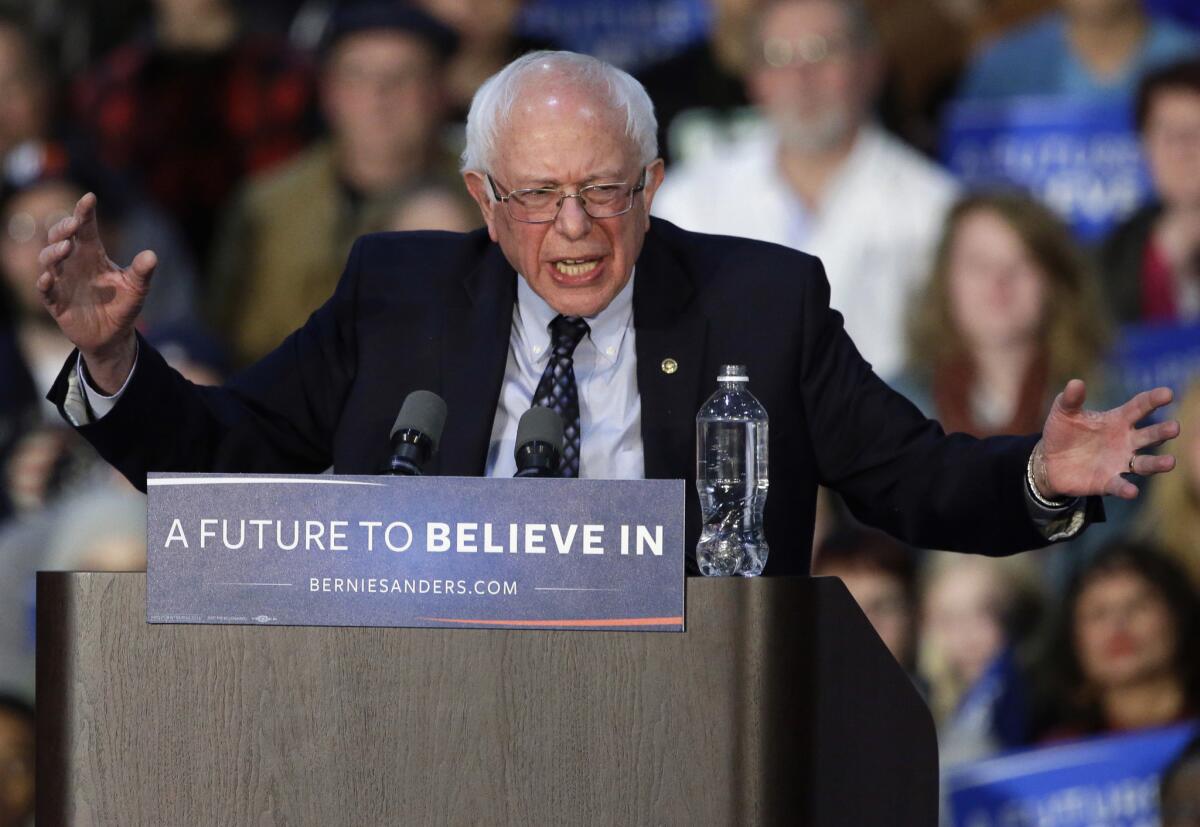Editorial: Campaign 2016: Sanders and Trump dump on free trade, but they’re not telling the whole story

Sen. Bernie Sanders speaks during a rally at Grand Valley State University Field House Arena in Allendale, Mich., on March 4.
- Share via
The victories by Republican billionaire Donald Trump and democratic socialist Bernie Sanders in Michigan’s presidential primaries Tuesday show how a powerful populist current is uniting voters on the right and left against a common enemy, namely, the Washington establishment. And one of the issues on which industrial-state primary voters are rebelling most strongly is trade. Despite the support for free-trade deals by a long succession of presidents and Congresses, a lot of voters still see these agreements making their lives worse, not better.
That’s why it’s hard to find any candidate in the current race who is an unequivocal free-trader. Only Ohio’s Republican Gov. John Kasich seems to fit that bill; he voted for the North American Free Trade Agreement and has said the pending Trans-Pacific Partnership is “critical” to the country’s economic competition with China. The others have either backed away from their earlier support for TPP (Sen. Marco Rubio of Florida and former Secretary of State Hillary Clinton), tried to make its passage more difficult (Sen. Ted Cruz of Texas) or outright denounced it and other free-trade pacts (Trump and Sen. Sanders of Vermont).
The ultimate goal is to have the rest of the world impose the same rules on their companies that we’ve been imposing on ours.
The inflammatory critiques by Trump, who has said the TPP is “insanity,” and Sanders, who tweeted that “43,000 Michiganders lost their jobs due to NAFTA,” have resonated in the nation’s manufacturing regions, many of which have seen a significant number of higher-paying jobs evaporate. And while increased productivity and automation have been important factors too, economists agree that free-trade deals have contributed to those losses.
Supporters of these deals note that they create jobs in the United States as well, in businesses that rely on imported parts or products and in those with customers around the globe. And those new jobs often pay better than the ones that were lost. But rarely do the newly created jobs benefit the individuals and communities that are hurt by global competition. Expanding Apple’s payroll won’t bring much comfort to an idled autoworker in Detroit. Nor have federal retraining programs been very effective at helping laid-off workers (especially older ones) find new jobs that pay as well as the ones they lost.
Americans’ anxiety about trade has only been heightened by a protracted period of stagnating incomes for those in and below the middle class. Those households’ average incomes have grown only slightly faster than inflation, if at all, for much of the last 50 years. Combine that with the prevailing view that the country is heading down the wrong track and that future economic prospects are dim, and you’ve got an electorate primed for the message that Trump and Sanders are delivering on trade deals.
But when Sanders criticizes NAFTA by saying, “American workers should not be forced to compete against people in Mexico making 25 cents an hour,” he overlooks the fact that American workers were already competing with Mexican workers, as well as those from countless other low-wage countries. Globalization isn’t a product of trade deals, it’s a product of developing economies becoming more connected commercially to the developed world by technology and other forces.
That’s why the U.S. focus as it negotiates these pacts is shifting from reducing tariffs — which, by the way, are lower in the United States than in most of the countries it negotiates these deals with — to other factors that affect the cost of doing business in a country. These include minimum wages, safety standards and other labor rules, environmental regulations, protections for intellectual property and limits on the regulation of online businesses. The ultimate goal is to have the rest of the world impose the same rules on their companies that we’ve been imposing on ours, so that competition will occur on a more level global playing field.
As Kasich has noted, being in favor of free trade doesn’t mean automatically supporting every proposed deal. Multinational agreements such as the TPP include a lot of compromises, and some of these may not be worth making. But to categorically oppose trade deals is to say that the U.S. shouldn’t try to bring the rest of the world up to the labor, environmental and commercial standards that apply here. That’s a losing strategy, and it would only increase the pressure on policymakers to return to the bad old days of high tariffs that inhibited trade and impeded growth for all concerned.
A cure for the common opinion
Get thought-provoking perspectives with our weekly newsletter.
You may occasionally receive promotional content from the Los Angeles Times.






